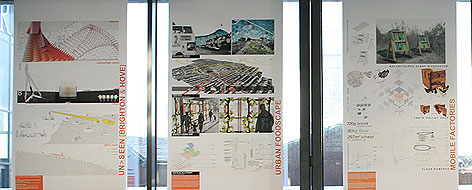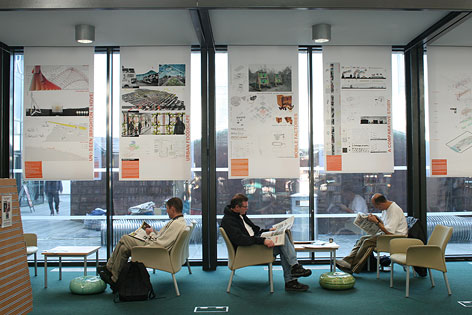Andre Viljoen's and Katrin Bohn's work culminates in the Continuous Productive Urban Landscape
15 Aug 2013

It seems that the New Year could become an important one for Bohn & Viljoen’s on-going design research work into food producing urban landscapes and the City of Brighton & Hove.
Andre Viljoen's and Katrin Bohn's (both senior lecturers at SAD and partners in Bohn & Viljoen Architects) are involved in research into developing sustainable design strategies for contemporary cities which led to their definition of the 'Continuous Productive Urban Landscape (CPUL)' and the 'CPUL City' concept.
The concept of 'CPUL City' provides a strategic and associative framework for the theoretical and practical exploration of productive landscapes within contemporary urban design. It describes the vision for a sustainable urban future based on the planned physical andsocietal introduction socio-economic integration of continuous productive urban landscape (CPUL) into existing or emerging cities. 'Continuous Productive Urban Landscape (CPUL)' proposes a design strategy for the coherent introduction of interlinked productive - namely urban agricultural - landscapes into cities thereby creating a new urban infrastructure and supporting a re-definition of open urban space usages.
Now and over the last few years, Bohn and Viljoen’s work turns to Brighton and Hove where a series of live projects could lay the basis for the establishment of the UK’s first CPUL. Before Christmas, Andre and colleagues asked postgraduate architecture students to examine food systems and their spatial and social consequences within Brighton and Hove. Before Christmas, postgraduate architecture students taught, amongst others by Andre Viljoen, undertook a Brighton & Hove CPUL study examining food systems and their spatial and social consequences within the city.

The study concluded with an exhibition and public seminar at Brighton’s Jubilee Library engaging representatives of Brighon & Hove Council as well as of several community groups and to coincide with the Copenhagen Climate Change Conference. A report of the event is being prepared for dissemination via the CRD’s Sustainability Network website contributing to the debate already initiated in the city about food systems and their impact on the quality of urban life.
Katrin will now make further use of the data collected by Andre’s students to run a public visualisation project titled 'UNLOCKING SPACE : Mapping Spatial Opportunities in Brighton and Hove'.
For this, Katrin has attracted external funding from the Creative Campus Initiative (Cultural Olympiad). 'UNLOCKING SPACE' proposes to map and visualise open urban space in Brighton and Hove that has scope to be more intensively used for both, sportive and communal activities. Using her expertise in designing for productive urban landscapes, Bohn will draw an Opportunity Map identifying underused open space in Brighton and Hove that could be enhanced in a sustainable way through a superposition of different public uses by different members of the public and including uses for urban food growing. This Opportunity Map will then become the centre of a public interactive exhibition (paper and/or online) to generate discussion within the local community on issues related to public space use, active lifestyles (leisure and commercial), personal health and urban sustainability.
Seeing these two recent projects in relation to the on-going 'Edible Campus' initiative at the University of Brighton (co-ordinated by Viljoen) and to the University’s involvement with 'Harvest Brighton and Hove', a National-Lottery-funded project to encourage food growing in the city (co-ordinated by Viljoen and Prof N Ravenscroft, School of the Environment), it becomes evident that there is a body of work emerging to establish a Continuous Productive Urban Landscape in Brighton and Hove.
Andre Viljoen and Katrin Bohn are senior lecturers in architecture at the University of Brighton Faculty of Arts.